Dealer Spotlight
Spencer Marks, Ltd.
An interview conducted by Deidre Healy
Published in the New England Antiques Journal in January 2018
The booth of Spencer Gordon and Mark McHugh’s – trading as Spencer Marks – is a gleaming jewel on the floor of the Delaware Antiques Show. Experts of more than 30 years in the field of American Silver, Spencer Mark’s clients range from new to knowledgeable, and include serious collectors, historical societies, and some of the most important museums in the United States.
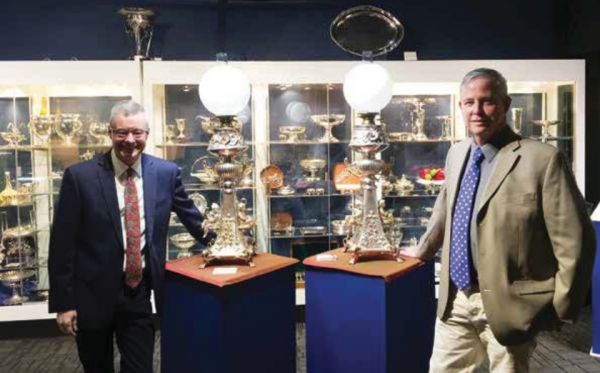
A typical Spencer Marks booth at a show. Spencer is on the left, Mark on the right.
Diedre: Where are you both from?
Spencer: I’m from Chevy Chase, Maryland. I studied history at Boston University, where I met Mark, and did graduate studies in the decorative arts.
Mark: I grew up in Norwood, Mass. I went to UMass, Amherst and I have degrees in German and teaching.
Diedre: Do you use your German?
Mark: I don’t have much chance to use it, but I watch movies and I can still hold a conversation. After college I became certified in five programming languages and went into management, designing computer systems for the phone company for twenty years.
Diedre: You met at school?
Mark: Yes, we met 34 years ago, love at first sight, and got married as soon as we could.
Diedre: Did either of your families have a background in antiques or the arts?
Spencer: My mom and dad were not really collectors per se but I grew up with antiques and I’ve always been interested in them.
Diedre: Any antiques collectors in your family, Mark?
Mark: Not a one. I joke that they still don’t know what we do, they just know we leave town a lot.
Diedre: How did Spencer Marks come about?
Mark: Well, Spencer worked for someone who sold Royal Doulton.
Spencer: Back in the 1980s. So, my boss was doing this and I just kind of figured that it’d be fun for us to do this.
Mark: We picked it up as a hobby and turned it into a business. We started with nothing, we were 23 and we started by putting things into a co-op in New Hampshire on the weekends.
Spencer: We sold a broad selection of pieces and became silver specialists over the years. We’ve always liked the way that silver has so many levels of meaning and significance; as a precious metal it has historically been used in ways that are precious to people and we work to bring these pieces and their context back to life.
Diedre: What was the field like when you were just beginning?
Mark: It was very competitive, there were a lot of silver dealers and wonderful collectors. People gave silver as gifts, and it was tradition to give silver at weddings and births. We ourselves still hold to that tradition, whenever someone in our family has a child we have our silversmith create something unique for them.
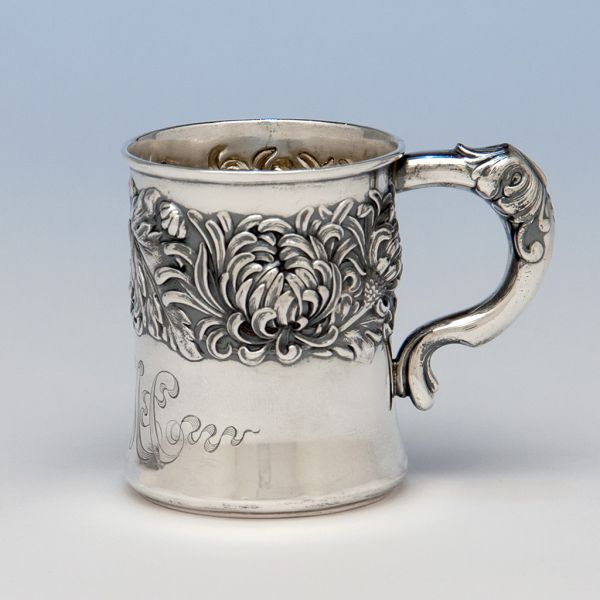
Shiebler “Chrysanthemum” pattern antique sterling silver child’s cup, New York City,c. 1880s.
Diedre: What is Spencer Marks’ area of speciality?
Spencer: We are best known for our nineteenth- and twentieth-century American silver. That’s not to say there isn’t other material, but that is our focus and the strength of our inventory. Stylistically, it covers a wide variety: Victorian Rococo Revival, Aesthetic Movement, Arts and Crafts, Art Deco and more.
Mark: Ultimately, what is important to us are design, condition, and uniqueness. Although there are lots of great production patterns and pieces, we focus on more unique things.
Diedre: Spencer Marks is known for the discovery of fabulous objects, do you have a story to share?
Spencer: We’ve really been fortunate to have a lot of objects that excite us.
Mark: One of our greatest finds was a beautiful early nineteenth-century Chinese Export cider jug by Sunshing. As we researched the dates and the monograms, we discovered that they matched up to the marriages of generations of the Winslow family; ultimately, we traced their ancestors all the way back to the Mayflower.
Spencer: We sold the Pomfret Chapel Altar Vases, one of Arthur Stones’ masterpieces, to an important institution. Arthur Stone was a great Arts and Crafts master. The vases, commissioned for the Pomfret School, are among the most important things his shop ever produced. Extraordinary pieces.
Mark: You know, as we were doing this and developing, it took years to build a business. I was working full time while Spencer formed the business. It was very difficult. We worked weekends - it didn’t happen overnight.
Spencer: It is amazing we started this over thirty years ago, back then we were “the boys” - we’re still called that sometimes.
Mark: Which makes me laugh.
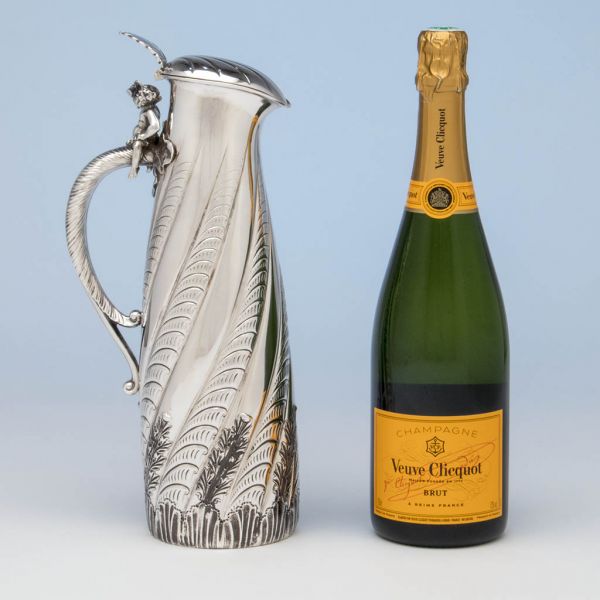
Gorham antique sterling silver champagne pitcher, Providence, RI, 1886.
Spencer: It’s interesting evolving into more senior members of this community; we’ve been fortunate to have been mentored by amazing people. We have built relationships with major collectors throughout the country; we deal a lot with institutions.
Diedre: Do you have younger collectors?
Mark: Yes, although younger people collect differently today, it has to strike a chord with them, it’s not necessarily the maker or the period, it’s more the object and whether they fall in love with it.
Spencer: People connect to objects in different ways; for example, we sold a Gorham “Polar” ice bowl to a couple who’d just been on a trip to the arctic.
Diedre: Anything really fun or unusual in your booth today?
Spencer: There are so many of fun and unusual things. An incredibly rare piece we have in our booth today is a piece of holloware from the late nineteenth century, it’s a champagne pitcher.
Mark: We’d never even heard of it. Amazing.
Spencer: It was an idea that didn’t last, but it reminds us that the nineteenth-century dining culture was incredibly important, therefore, many objects were created to be part of dining rituals. Certainly, one could find a new use for that piece today.
Diedre: People think that silver is too high maintenance, but they’re mistaken, aren’t they?
Mark: It’s not hard to take care of silver.
Spencer: We use our silver all the time, and if you wash it and dry it, that’s 95 percent of your maintenance.
Mark: I mean, if you want a nice lawn, you have to mow it and take care of it. If you are fortunate enough to have silver, you should use and enjoy it.
Spencer: It is striking to me how inexpensive it is now vis-a-vis its historic value. When these pieces were made they represented a tremendous amount of wealth. People didn’t have banks, when they made money they had it turned into these beautiful objects. Historically, they are incredibly inexpensive, now is a good time to buy.
Mark: I think that people’s lifestyles are more frantic now. Afternoon tea used to be an important social event, receiving an invitation to tea was a compliment. It was a very personal thing, people would sit and talk to each other, not just run into Starbucks and always be on the fly. It’s the same thing with dinner, having dinner by candlelight, having some nice silverware, it makes everything more personal.
Spencer: Our dear friend Norma, who had a silver kiosk in Boston, was a wonderful inspiration to us. One of the things she did - and she told all her clients to do - was that even if you’re not wealthy you should buy one nice thing a year, and you know in ten years, you have a collection.
Mark: It’s all about relationships with people and relationships with objects.
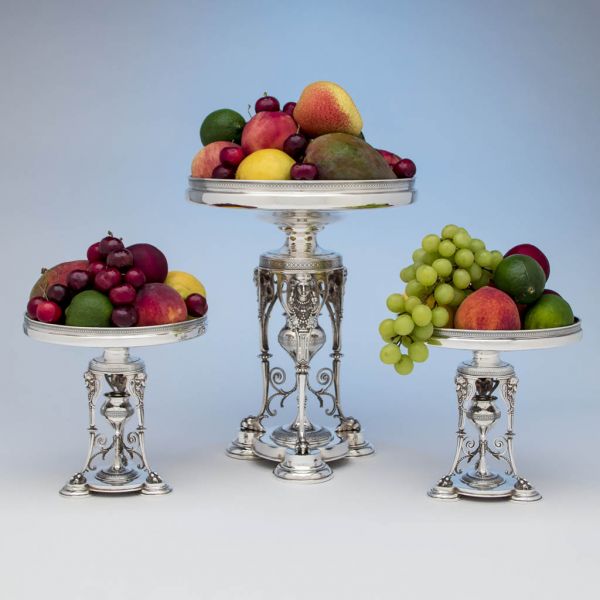
Tiffany & Co antique sterling silver figural garniture suite, New York City, 1870-75.
Diedre: How do you use your silver?
Mark: We use our Fletcher and Gardiner silver service for dinner everyday. We use it for formal dining with friends, we use it at the kitchen table and with TV dinners.
Spencer: We also collect cans (mugs) and we use them. Beer tastes great out of silver.
Diedre: What roles do you each take on in the business?
Mark: Spencer is much more the academic; I think I’m better at finding interesting objects. So I do the hunting and he does the research, I do the photography and the website. One thing people don’t realize is how hard antiques dealers work. I used to have an eight to nine-hour job and then I became an antique dealer and now it’s like, doubled. We also work weekends.
Spencer: The truth is that we enjoy the work we do.
Mark: You have to love it because you work so hard at it. It’s something we have in common - the love of the business. We’re very people-oriented also, so the shows are fun for us, we get out of the house, we meet a lot of people, and we have relationships with a lot of the regulars. At home, we have great groups of friends, so we get together for dinners, drinks and a lot of laughs.
Spencer: We go to concerts. Tanglewood is a great part of living in Western Massachusetts.
Mark: Music in the house is stuck in the 80s New Wave genre. We just saw the Psychedelic Furs a couple weeks ago, and the Motels earlier this year. I’ve seen the B52s.
Spencer: I’m not quite as stuck in the 80s. Sometimes it’s Mozart or Mahler.
Diedre: I know you’re on the road quite a lot, do you travel for leisure?
Spencer: Most recently, we visited Portugal which was a total blast. We also take time off to enjoy the cities we visit for shows.
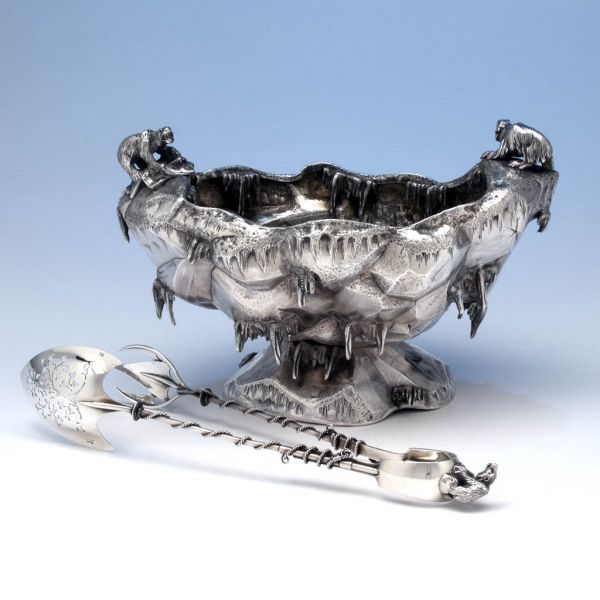
Gorham sterling silver “Polar” ice bowl and tongs, Providence, RI, c.1882.
Diedre: Any museum collections you recommend for people interested in learning more about silver?
Spencer: Obviously the Met, Philadelphia, Boston, and Winterthur. Yale has a fantastic collection with great educational programs available to the public and they have free membership. RISD (Rhode Island School of Design) has an extraordinary collection of Gorham Silver. The curator there, Elizabeth Williams, is actually putting together a traveling exhibition of the collection opening in 2019. We have been sharing our research with the collaborators, and we’re sponsoring both the exhibition and the catalog. It’s one of the ways we’re giving back to the field, and it’s been an exciting project.
Diedre: What advice do you have for someone newly interested in silver objects?
Spencer: Buy what you like. The trick with silver is to handle it, the tactile part of it is lost when it sits in a case. I simply encourage people to handle things and get to know what they love because it’s a wonderful thing.
Mark: That’s why we carry such a wide range, we want to appeal to a lot of people, and we want people when they come in to educate themselves on the different periods of silver and styles. A lot of people are even mixing periods and styles now, it’s more what they fancy.
Spencer: You know, it’s one percent of silver that you have to be careful with, the rest can be used. These objects are 100, 200 years old, you can keep on using them, they’ll last forever. They have history, they have a story, they’ve led happy lives and you know, the silver doesn’t like just living in a cabinet.
Mark: We have a few things at home that we’ll pass down and keep as heirlooms in the families. This is a tradition that people sort of lost sight of; objects passed through families are an important connection, it’s very rewarding to have a family memento.
Spencer: Not just family, we have pieces from friends in the field, those things matter to us, too. There are many connections to the pieces in our home.
Diedre: Thank you for your time today.
Spencer: Here’s a teaser, we have some really important pieces set aside for the Winter Antiques Show.
Spencer Marks, www. spencermarks.com. 413-527-7344
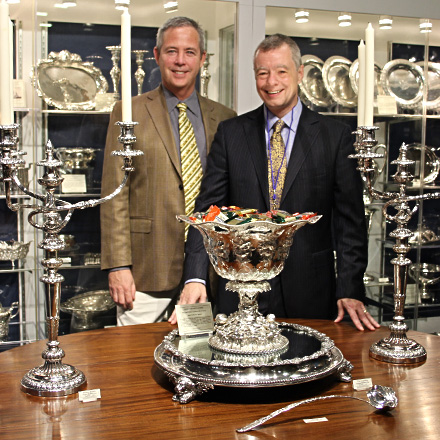
<< Back to list page - Email this Page
